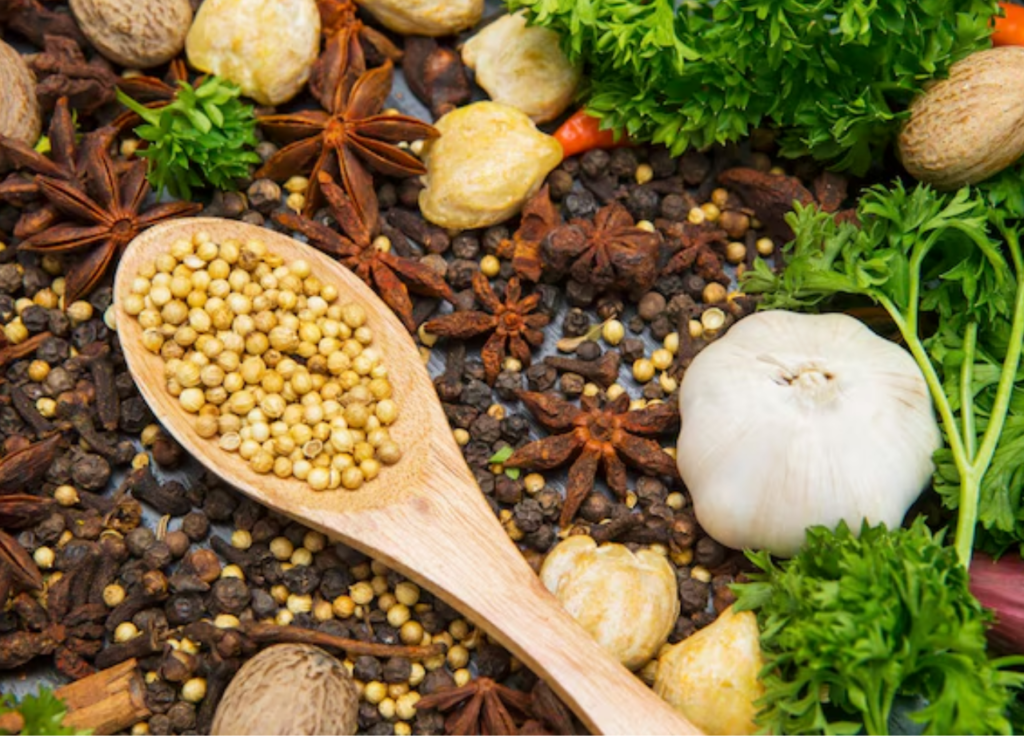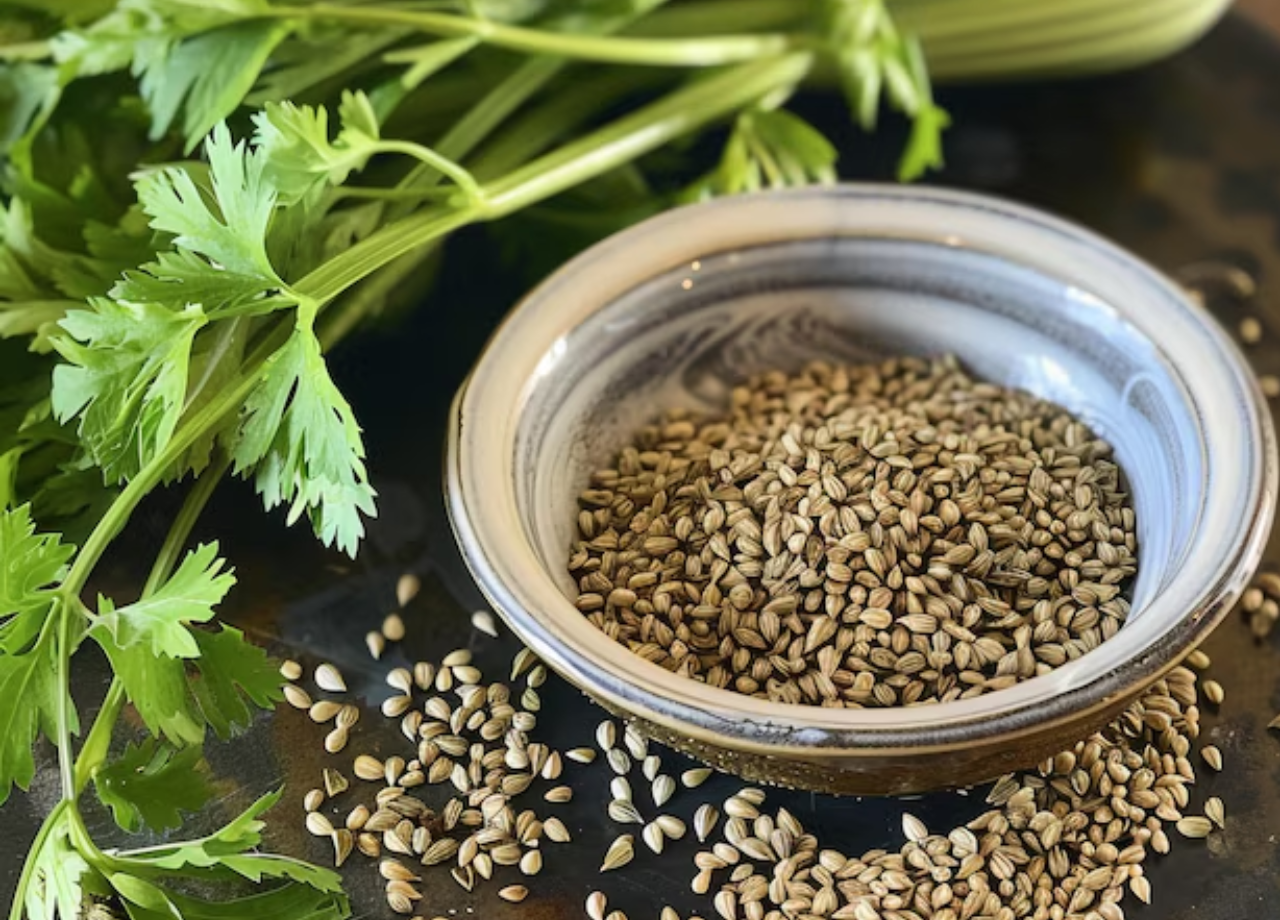Introduction
Coriander seeds, known for their unique flavor and aromatic properties, are a staple in many kitchens around the world. These small, round seeds pack a punch, not just in taste but also in health benefits. Mastering the versatility of coriander seeds can enhance your dishes and support your health, whether you’re an experienced chef or enjoy cooking at home. In this article, we’ll dive deep into everything you need to know about coriander seeds. We’ll explore their origins, culinary uses, health benefits, and more. By the end, you’ll have a comprehensive understanding of why coriander seeds deserve a spot in your pantry and how you can make the most of them in your daily life.
Table of Contents
What Are Coriander Seeds?
Coriander seeds come from the coriander plant (Coriandrum sativum), which is also known as cilantro or Chinese parsley. While the leaves of this plant are widely used in cooking, the seeds are a separate entity with a different flavor profile. When dried, coriander seeds have a warm, citrusy, and slightly nutty flavor, making them a versatile ingredient in both sweet and savory dishes.
The History and Origins of Coriander Seeds
Coriander seeds have been used for thousands of years, dating back to ancient civilizations. Historical records indicate that coriander was cultivated in ancient Egypt, where it was used both as a culinary spice and a medicinal herb. The seeds were even found in the tomb of Tutankhamun, indicating their value in ancient times.
From Egypt, the use of coriander seeds spread to the Mediterranean region, Europe, and Asia. Today, coriander seeds are a key ingredient in various global cuisines, including Indian, Middle Eastern, Mexican, and Mediterranean dishes.
Nutritional Value of Coriander Seeds

Coriander seeds are not just a flavorful addition to your dishes; they are also packed with nutrients. Here’s a breakdown of the nutritional content of coriander seeds:
Vitamins: Coriander seeds are rich in vitamins A, C, and K. These vitamins are essential for maintaining healthy skin, boosting immunity, and promoting bone health.
Minerals: The seeds are a good source of minerals like potassium, calcium, iron, and magnesium. These minerals play a crucial role in maintaining heart health, bone strength, and overall vitality.
Fiber: Coriander seeds are high in dietary fiber, which aids in digestion and helps regulate blood sugar levels.
Antioxidants: These seeds are loaded with antioxidants, which help combat free radicals in the body, reducing the risk of chronic diseases.
Health Benefits of Coriander Seeds
Coriander seeds offer a wide range of health benefits, making them a valuable addition to your diet. Here are a few of the key advantages:
1. Improves Digestion
Coriander seeds are recognized for their role in supporting digestive health. The seeds contain essential oils that stimulate the production of digestive enzymes, helping to break down food more efficiently. This can alleviate symptoms of indigestion, bloating, and gas.
2. Regulates blood sugar levels
For those with diabetes or at risk of developing the condition, coriander seeds can be particularly beneficial. The seeds help regulate blood sugar levels by enhancing the secretion of insulin and improving the body’s ability to use glucose effectively.
3. Supports heart health
The heart-healthy benefits of coriander seeds are attributed to their high content of antioxidants and dietary fiber. These nutrients help reduce cholesterol levels, lower blood pressure, and improve overall cardiovascular health.
4. Boosts immunity
Coriander seeds are rich in antioxidants, which play a vital role in boosting the immune system. These antioxidants help protect the body against infections and diseases by neutralizing harmful free radicals.
5. Anti-inflammatory Properties
Coriander seeds have natural antiinflammatory properties that can help reduce inflammation in the body. This makes them beneficial for individuals with conditions like arthritis, as they can help alleviate pain and swelling.
6. Promotes skin health
The vitamins and antioxidants in coriander seeds contribute to healthy, glowing skin. They can help treat skin conditions like acne, eczema, and dryness. Additionally, the seeds can be used to make a soothing face mask that rejuvenates the skin.
7. Aids in Weight Loss
Coriander seeds can also be a valuable ally in weight loss efforts. The seeds help improve metabolism, reduce water retention, and promote the elimination of toxins from the body, all of which can contribute to weight loss.
Culinary Uses of Coriander Seeds
Coriander seeds are a versatile spice that can be used in a variety of culinary applications. Here are some popular ways to incorporate coriander seeds into your cooking:
1. Whole Seeds
Whole coriander seeds can be added to pickling spices, marinades, and broths. They add a warm, citrusy taste to dishes and are commonly found in Indian curries, Middle Eastern stews, and Mexican salsas.
2. Ground coriander
Grinding coriander seeds into fine powder is a common practice in many kitchens. Ground coriander is used as a spice in baking, meat rubs, spice blends, and vegetable dishes. Its subtle taste pairs well with many different ingredients, making it a must-have in the kitchen.
3. Toasted coriander seeds
Toasting coriander seeds enhances their flavor and aroma. Simply heat a dry skillet over medium heat, add the seeds, and toast them until they become fragrant. Toasted coriander seeds can be used in salads, soups, and as a garnish for roasted vegetables.
4. Coriander Seed Tea
Coriander seed tea is a popular beverage in traditional medicine, known for its digestive benefits. To make the tea, crush a tablespoon of coriander seeds and steep them in boiling water for about 10 minutes. Strain and enjoy a soothing, flavorful tea that aids digestion and relieves bloating.
How to Store Coriander Seeds

Proper storage is key to maintaining the flavor and potency of coriander seeds. Here are some tips for storing coriander seeds:
Keep Them Whole: If possible, store coriander seeds whole rather than ground. Whole seeds retain their flavor longer than ground coriander.
Use Airtight Containers: Store coriander seeds in an airtight container to protect them from moisture and air. Sealed glass containers are highly effective.
Store in a Cool, Dark Place: Keep the container in a cool, dark place, away from direct sunlight. This helps prevent the seeds from losing their flavor and aroma.
Avoid refrigeration: There’s no need to refrigerate coriander seeds. Room temperature storage is sufficient as long as the environment is dry and cool.
Coriander Seeds in Traditional Medicine
For centuries, coriander seeds have been utilized in traditional medicine. Their medicinal properties are recognized in various systems of medicine, including Ayurveda, Traditional Chinese Medicine, and Unani. Here’s how coriander seeds are used in traditional medicine:
1. Ayurveda
In Ayurveda, coriander seeds are considered a cooling spice that balances the body’s doshas, particularly Pitta. They are used to treat digestive issues, fever, and urinary tract infections. Coriander seed water, known as “Dhania water,” is commonly consumed for its detoxifying and cooling effects.
2. Traditional Chinese Medicine
In Traditional Chinese Medicine (TCM), coriander seeds are believed to promote digestion, relieve nausea, and reduce bloating. They are also used to alleviate colds and flu symptoms by warming the body and improving circulation.
3. Unani Medicine
In Unani medicine, coriander seeds are used to treat a variety of ailments, including digestive disorders, anxiety, and insomnia. The seeds are often combined with other herbs to create remedies that target specific health conditions.
Growing Your Own Coriander Seeds
If you’re a gardening enthusiast, you might consider growing your own coriander seeds. Not only is this a rewarding experience, but it also ensures you have a fresh supply of seeds whenever you need them. Here’s how to grow coriander seeds at home:
1. Planting
Start by planting coriander seeds in well-drained soil, ideally in a sunny spot. Plant the seeds at a depth of approximately 1/4 inch, then gently cover them with soil. Keep the soil consistently moist by watering regularly, but avoid overwatering.
2. Caring for the Plants
Coriander plants require minimal care. Ensure they receive enough sunlight, and water them regularly. As the plants grow, thin them out to allow space for each plant to develop fully.
3. Harvesting the Seeds
Coriander seeds are ready to harvest when the plant starts to turn brown and the seeds become dry and brittle. Trim the plant and suspend it upside down in a cool, dry area. Once the seeds are completely dry, gently rub them off the stems and store them in an airtight container.
Coriander Seeds in Global Cuisines
Coriander seeds are a key ingredient used in many cuisines around the world. Here’s how they are used around the world:
1. Indian Cuisine
In Indian cuisine, coriander seeds are a key ingredient in spice blends like garam masala and curry powder. They are used to flavor dals, curries, pickles, and chutneys. The seeds are also toasted and ground to make coriander powder, which is used in countless dishes.
2. Middle Eastern Cuisine
Coriander seeds are widely used in Middle Eastern cooking, where they add depth to stews, tagines, and roasted meats. The seeds are often combined with cumin, another staple spice in the region, to create a rich, aromatic flavor profile.
3. Mexican Cuisine
ICoriander seeds are commonly used in Mexican cooking to enhance the flavors of salsas, soups, and meat dishes. They are an essential ingredient in mole sauce, a complex, richly flavored sauce that is a hallmark of Mexican cooking.
4. Mediterranean Cuisine
Coriander seeds are popular in Mediterranean cuisine, where they are used to season vegetables, fish, and meats. They are also added to marinades, salad dressings, and bread dough to impart a unique flavor.
Coriander seeds in beverages
Coriander seeds aren’t only for culinary purposes; they can also be utilized to make invigorating and beneficial drinks. Here are a few ideas:
1. Coriander Seed Lemonade
Add a twist to your regular lemonade by infusing it with coriander seeds. Simply crush a tablespoon of coriander seeds and steep them in hot water. Let the water cool, then strain it and add lemon juice, honey, and ice for a refreshing drink.
2. Coriander seed smoothie
Boost your morning smoothie with the addition of ground coriander seeds. The seeds add a subtle flavor and a nutrient boost to your smoothie. Try blending them with fruits like mango, banana, and pineapple for a tropical treat.
3. Coriander Seed Infused Water
For a simple and hydrating drink, infuse your water with coriander seeds. Crush a tablespoon of seeds and add them to a pitcher of water. Let the water sit for a few hours to allow the flavors to develop. Drink it throughout the day to stay hydrated and enjoy the health benefits of coriander seeds.
Coriander Seeds in Baking
Coriander seeds are an unexpected but delightful addition to baked goods. Their warm, citrusy flavor pairs well with both sweet and savory baked items. Here’s how you can incorporate coriander seeds into your baking:
1. Coriander Seed Bread
Add ground coriander seeds to your bread dough for a unique twist on homemade bread. The seeds impart a subtle flavor that complements whole grains and sourdough. Try adding them to rye or multigrain bread for a flavorful loaf.
2. Coriander Seed Cookies
For a different take on traditional cookies, add a pinch of ground coriander seeds to your cookie dough. The seeds add a warm, aromatic flavor that pairs well with spices like cinnamon and nutmeg.
3. Coriander Seed Cakes
Coriander seeds can be used to flavor cakes, particularly those with citrus or fruit components. Try adding ground coriander seeds to a lemon or orange cake for a deliciously aromatic dessert.
FAQs about Coriander Seeds
Q: Are coriander seeds the same as cilantro?
A: Coriander seeds come from the same plant as cilantro, but they are different parts of the plant. Cilantro refers to the leaves, while coriander seeds are the dried seeds of the plant.
Q: How do I grind coriander seeds?
A: To grind coriander seeds, use a spice grinder, mortar and pestle, or a coffee grinder. Grind them to your desired consistency, whether fine or coarse, depending on the recipe.
Q: Can I use coriander seeds in place of ground coriander?
A: Yes, you can use coriander seeds in place of ground coriander by grinding them. However, the flavor may be more intense, so adjust the quantity accordingly.
Q: Are coriander seeds gluten-free?
A: Yes, coriander seeds are naturally gluten-free, making them a safe choice for those with gluten sensitivities or celiac disease.
Q: Can coriander seeds help with weight loss?
A: Coriander seeds may aid in weight loss by improving digestion, boosting metabolism, and reducing water retention.
Q: How long do coriander seeds last?
A: When stored in an airtight container in a cool, dark place, coriander seeds can last for up to a year without losing their flavor.
Q: Can I grow coriander from coriander seeds?
A: Yes, you can grow coriander from coriander seeds. Ensure they are planted in soil with good drainage, and make sure they receive enough sunlight and water.
Conclusion
Coriander seeds are a powerhouse of flavor and health benefits. From their ancient origins to their modern culinary applications, these seeds have stood the test of time as a versatile and essential spice. Whether you’re using them in cooking, traditional medicine, or even gardening, coriander seeds offer a wide range of possibilities.
Incorporating coriander seeds into your diet can enhance your dishes and contribute to your overall well-being. Their unique flavor, coupled with their numerous health benefits, makes them a must-have in any kitchen. So, next time you reach for a spice, consider adding a pinch of coriander seeds to your recipe—you’ll be amazed at the difference it makes.
You Can See Latest Updates On: Leg Warmers



